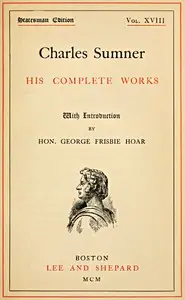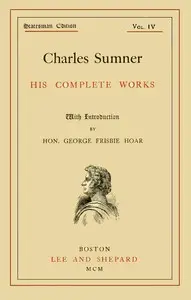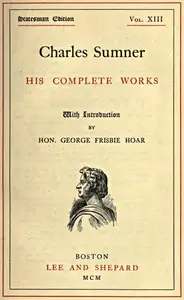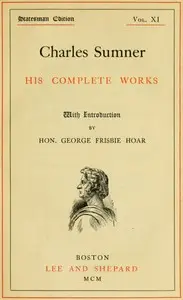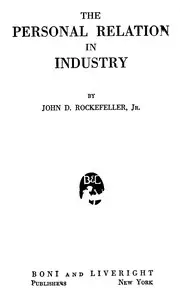"Charles Sumner: His Complete Works, Volume 17 (of 20)" by Charles Sumner is a historical collection of speeches and writings produced during the late 19th century. The work serves as a tribute to the political and social activism of Charles Sumner, a prominent abolitionist and U.S. Senator known for his fierce advocacy for civil rights and his outspoken opposition to slavery. This volume includes key resolutions and speeches that articulate Sumner's views on issues such as ocean postage, human rights, and the aftermath of the Civil War, reflecting the socio-political landscape of his time. The opening of this volume presents a series of resolutions and remarks that reveal Sumner's commitment to promoting equality and justice in a post-Civil War America. He begins with a resolution calling for lower ocean postage rates to enhance international communication, highlighting how such measures could foster goodwill and commerce. Following this, he pays tribute to Thaddeus Stevens, emphasizing Stevens' role as a champion of educational reform and civil rights. Sumner’s oratory reflects his belief in the essential equality of all people, expressing a deep moral conviction that undergirds his political arguments. Through these opening passages, readers gain insight into both Sumner's passionate advocacy for human rights and the broader context of 19th-century American politics. (This is an automatically generated summary.)
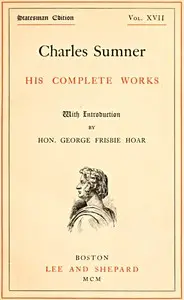
Charles Sumner: his complete works, volume 17 (of 20)
By Charles Sumner
"Charles Sumner: His Complete Works, Volume 17 (of 20)" by Charles Sumner is a historical collection of speeches and writings produced during the late...
Charles Sumner was an American lawyer, politician, and statesman who represented Massachusetts in the United States Senate from 1851 until his death in 1874. Before and during the American Civil War, he was a leading American advocate for the abolition of slavery. He chaired the Senate Foreign Relations Committee from 1861 to 1871, until he lost the position following a dispute with President Ulysses S. Grant over the attempted annexation of Santo Domingo. After breaking with Grant, he joined the Liberal Republican Party, spending his final two years in the Senate alienated from his party. Sumner had a controversial and divisive legacy for many years after his death, but in recent decades, his historical reputation has improved in recognition of his early support for racial equality.


